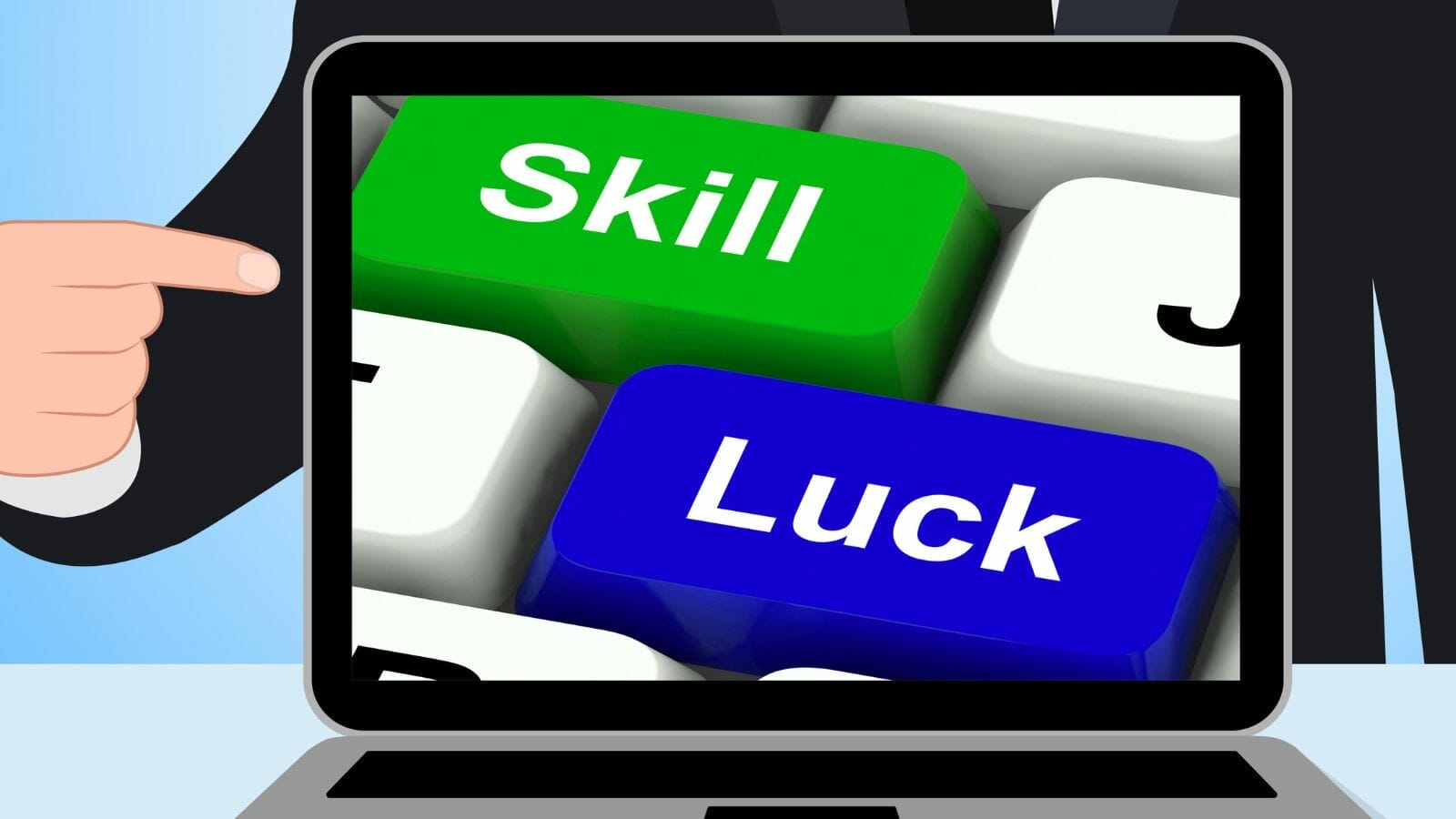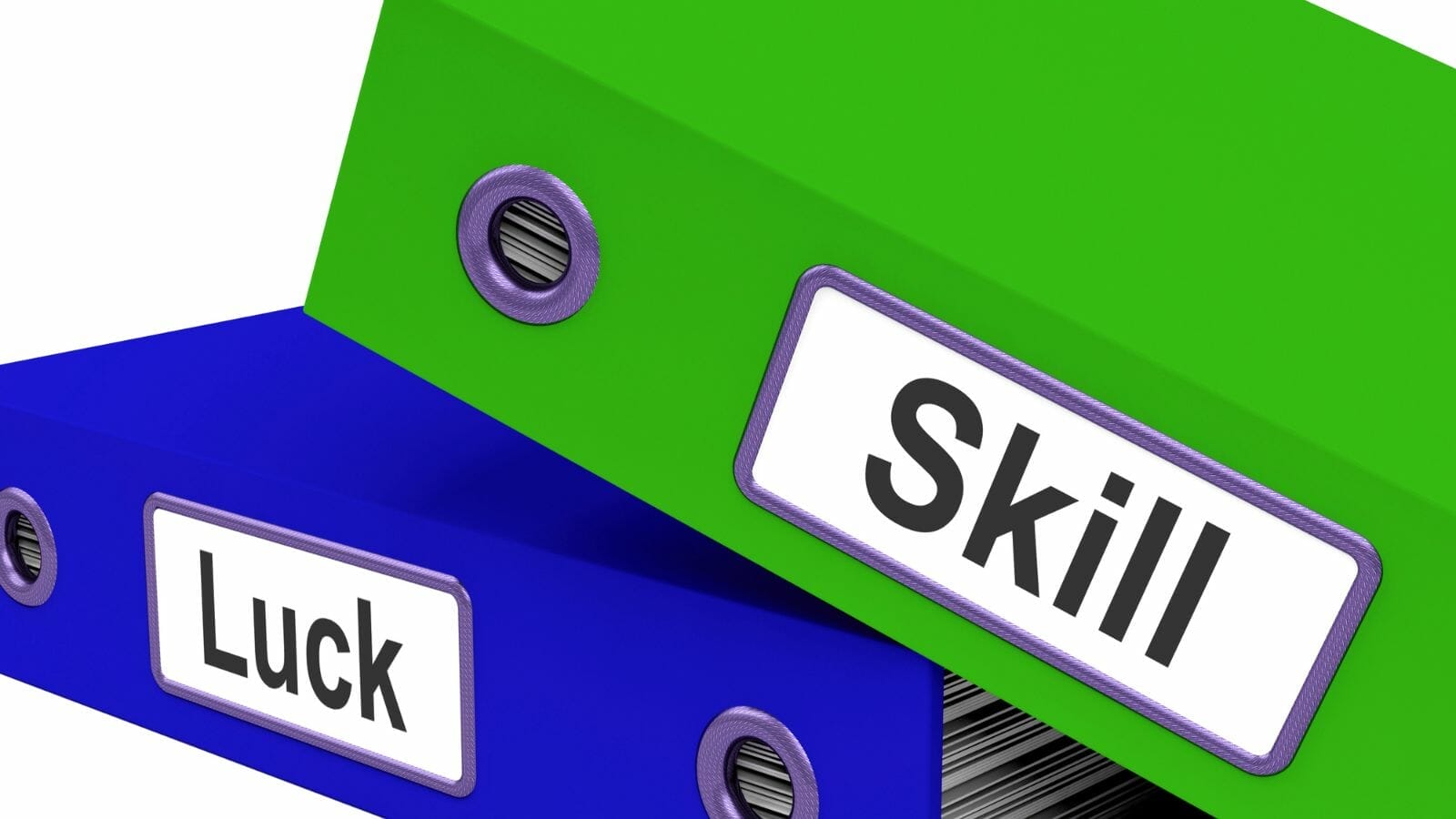When we succeed in investing or life, we tend to attribute success to skill or hard work. But when things go wrong, we tend to blame bad luck.
Well, which is it?
In business, investing, or sports, distinguishing between luck and skill can be challenging. We all love stories and want to understand the relationship between cause and effect. We want to believe the outcome came about as a result of skill or hard work.
But sometimes, luck can play a part in life and basketball too.
To become better investors, we must understand the relationship between skill and luck. The continuum of skill to luck can range from playing chess (skill) to playing slots at a casino (luck).
With a little work, we can improve our luck by getting better at the art of guesswork.
For example, we could consider Buffett’s investment in Apple as luck; instead, it was a matter of hard work, skill, and being in the right place at the right time.
In today’s post, we will learn:
- Defining Luck and Skill in Investing
- Analyzing Historical Performance
- Assessing Our Decision-Making Processes
- Examining Risk
- Overcoming Psychological Biases
Okay, let’s dive in and learn more about distinguishing luck from skill in investing.
Defining Luck and Skill in Investing
Luck and skill play distinct roles in investing, and understanding their differences is crucial for anyone hoping to succeed in the financial markets.

At its core, investing involves deciding where to put money to generate returns over time.
But how much of those returns can we attribute to luck, and how much to skill?
Luck, in the context of investing, refers to random and unpredictable events that can affect the performance of investments positively or negatively.
For example, an unexpected economic downturn or a sudden surge in demand for a particular product can impact the value of investments.
Luck is beyond an investor’s control and cannot be influenced or predicted. Some may experience fortunate outcomes due to pure chance, while others may suffer losses despite making thoughtful decisions.
On the other hand, skill in investing pertains to the ability to make informed and calculated choices based on the following:
- Research
- Analysis
- Expertise
Skilled investors employ various strategies to manage risk and identify promising opportunities. They thoroughly study financial statements, economic indicators, industry trends, and company fundamentals to make well-informed decisions. Skillful investors may also diversify their portfolios to spread risk effectively.
One of the key distinctions between luck and skill lies in their consistency.
Luck is fleeting and unpredictable, offering no assurance of long-term success. It can lead to sudden gains, but relying solely on luck is akin to gambling.
In contrast, skill endures over time, allowing investors to achieve more reliable and sustained results.
Another aspect that sets luck and skill apart is their impact on risk management.
Luck does not discriminate and can lead to gains and losses without any rational pattern. In contrast, skill allows investors to mitigate risks by making informed choices and developing effective risk management strategies.
Investors need to recognize the role of luck and skill in their investment journey.
While luck may play a part in short-term gains, relying on it alone is unwise. Developing and honing investing skills through education, experience, and continuous learning is the key to achieving long-term financial success and navigating the unpredictable nature of the market.
By combining skill with a well-thought-out investment plan, individuals can position themselves for a more prosperous financial future.
Analyzing Historical Performance
The easiest correlation between luck and skill in investing is sports. Michael Mauboussin outlines some important ideas around the connections.

For example, in his book, The Success Equation, he ranks the major US sports by luck, lowest to highest:
- NBA – 12%
- Premier League – 31%
- MLB – 34%
- NFL – 38%
- NHL – 53%
He notes that as the above sports’ skill grows increasingly close, the amount of luck impacting the outcome grows. In other words, as the players’ skills converge, hitters all become better and better; he sees less impact from the skill and more impact from luck.
We all remember the example of the “hot hand fallacy” from basketball.
In the example, the player keeps making shots, and with each shot, his confidence grows until they finally miss. You can attribute the hot streak to luck, or you can attribute it to skill.
Over time, the player will regress to their mean or skill level.
We can all remember a game or event where players have the game of their lives well outside their norms. They help the team win but return to normal production the next game.
Understanding how investments have performed in the past is an essential strategy for successful investing. It’s like learning from history to make smarter decisions with our money.
We call this process data-driven analysis, using facts and numbers to guide us.
By studying past performance, we can spot patterns that can help us predict how investments might do in the future. It’s like looking at the weather patterns from previous years to guess if it will rain or be sunny tomorrow.
If we see certain investments consistently doing better than others, it could be a sign of skillful investing.
Like a basketball player, Michael Jordan, who always scores points – he has a skill for it. So, we might want to consider putting our money with those skilled investors like Buffett or Munger.
Analyzing historical performance helps us make wise choices, reduce risks, and increase our chances of success in the exciting investing world. Remember, knowledge is power, and using data to guide our decisions is a smart move for any investor.
Assessing Our Decision-Making Processes
Making good investment decisions involves understanding how we arrive at those choices. It’s like figuring out the recipe for our favorite pasta carbonara dish.

To do this, we must examine the factors influencing our decisions.
Sometimes, emotions, news, or advice from friends can sway our choices. These factors might not always lead to the best outcomes.
Michael Mauboussin likes to talk about the differences between IQ and RQ.
RQ (rationality quotient) remains quite different from IQ (intelligence quotient).
RQ involves adaptive behavioral acts, reasonable decision-making, efficient behavioral regulation, goal prioritization, reflectivity, and proper calibration of evidence. IQ does not confer RQ.
The study of RQ remains new, and we don’t understand everything related to the study. But it helps illustrate how smart people can make simple errors in judgment.
Imagine picking your favorite basketball team just because a friend likes it, but you end up not enjoying it as much. In investing, we need to be careful about such influences.
On the other hand, a well-informed decision is like studying all the basketball teams available, considering their players, and then choosing the one you like the most.
Similarly, investing means researching, studying the market, and understanding a company’s performance before investing.
It’s important to differentiate between well-informed choices and random actions.
Making decisions based on proper research and understanding will lead to success. Random actions, like making investments without thought, are more like throwing darts blindfolded and hoping they hit the target.
By assessing our decision-making process, we can avoid impulsive choices and increase our chances of making profitable investments. Like following a recipe step-by-step for a delicious dish, being mindful of the factors influencing our decisions will help us become smarter investors.
Examining Risk
Risk management is vital to successful investing, like wearing a seatbelt while driving to stay safe. It involves making choices that balance potential rewards with potential risks.

Let’s explore the importance of risk management and how it helps us become smart investors.
Investing always carries some risk, like trying a new sport or game. But we don’t need to avoid it altogether. Instead, we must understand and manage risks wisely. It’s like crossing the street – we look both ways to avoid dangers and reach the other side safely.
There’s a difference between calculated risk-taking and reckless behavior. Calculated risk-taking is like studying a map before going on an adventurous hike.
We know there might be challenges, but we prepare for them.
Reckless behavior, on the other hand, is like going on the same hike without any preparation or gear.
One way to measure risk management is by evaluating risk-adjusted returns. It’s like comparing how well different athletes perform, considering their skill levels and challenges.
Similarly, we assess how well an investment performed, considering its risks.
Skillful investors aim for high risk-adjusted returns, achieving good results while managing risks effectively. It’s like scoring goals in soccer while keeping the opponent from scoring too much.
This requires making thoughtful decisions, being aware of potential risks, and having a plan.
In contrast, reckless investors might get lucky sometimes but often face big losses.
Imagine playing a video game without understanding the rules – we might get lucky and win a level, but overall, it’s tough to succeed without knowing what we’re doing!
Being mindful of risk management helps us make better investment choices.
It’s like a safety net, protecting us from major financial setbacks. By understanding the importance of risk management, we can avoid impulsive decisions and think long-term.
To sum it up, risk management is like having a map and a compass while going on a journey. It guides us, helps us avoid pitfalls, and increases our chances of reaching our destination successfully.
Overcoming Psychological Biases
Michael Mauboussin, a prominent investment strategist, has delved into two essential concepts that significantly impact the investing world: psychological biases and the interplay between luck and skill.

Let’s explore these ideas to understand how they influence our decision-making and investment outcomes.
Psychological biases are like sneaky traps that our minds fall into, leading us to make irrational choices without realizing them.
Imagine a magician performing a trick – we might think we’re seeing something amazing, but it’s just an illusion. Similarly, biases can cloud our judgment and affect our investment decisions.
One common bias is overconfidence, where we believe we are more knowledgeable and skilled than we are.
It’s like being overly confident about answering a class question without knowing the correct answer. Investing can lead us to take excessive risks or overlook important information.
Another prevalent bias is the herd mentality, where we follow the crowd without critically evaluating the situation. It’s like joining a long line for a popular ride at an amusement park without considering if the wait is worth it.
Investing can lead to a rush of investors all buying the same asset, which may not always be the best choice.
The recent meme stock craze in 2021 remains the perfect example of herd mentality; everyone buying AMC or Gamestop during a wild period – herd mentality in full swing.
Recognizing and managing these biases is crucial for successful investing. It’s like wearing sunglasses to protect our eyes from harmful glare. By being aware of our biases, we can make more rational and thoughtful decisions, reducing the impact of emotional impulses.
The second concept, the balance between luck and skill, is crucial to investing.
Think of it as understanding the difference between winning a lottery and being a skilled basketball player. Luck can influence short-term outcomes, like winning a lottery ticket based on chance.
However, when it comes to long-term success, skill plays a more significant role, just like a basketball player consistently winning games due to their abilities and hard work.
Mauboussin emphasizes that luck can sway investment results in the short term. A few lucky picks may lead to gains, but this doesn’t necessarily indicate skill. Over time, the skill becomes more apparent, as consistently making good decisions leads to positive returns.
To become skilled investors, we must focus on our decision-making process and gather data to support our choices.
It’s like preparing for a test by studying and reviewing the material. By honing our skills and being disciplined, we can increase the likelihood of making successful investment decisions.
Michael Mauboussin’s ideas on psychological biases and the balance between luck and skill are invaluable for any investor.
By recognizing and managing our biases and focusing on developing our skills, we can make better decisions and improve our chances of achieving long-term success in the dynamic and unpredictable world of investing.
Knowing our psychological tendencies and understanding the role of luck and skill will help us navigate the complex financial landscape more confidently and resiliently.
Investor Takeaway
Luck and skill go hand in hand in the investing world. Like the basketball player who gets a hot hand or the baseball player who hits everything thrown at them, investing offers the same correlation between luck and skill.
The more a participant improves their skill, the more luck can play a part in your investing skill.
Of course, we will see investors who get “lucky” by picking the next Amazon or Google. But these investors remain a rarity, and sometimes luck will land on some people and not others.
But the better you prepare and put yourself in situations where luck can play a part, the more opportunities for luck to land on you.
Our skills can give us those situations or present them more frequently.
But putting that skill to work with a proven process will yield a higher probability of success over time. We might occasionally have setbacks, but we will do well.
That’s still how successful long-term investing works.
And with that, we will wrap up our discussion regarding distinguishing between luck and skill in investing.
Thanks for reading, and hopefully, you found something of value. If I can further assist, please don’t hesitate to reach out.
Until next time, take care and be safe out there,
Dave
Related posts:
- 7 Simple Mindset Shifts to Conquer Investment Bias for Good Updated – 11/17/23 All humans have biases. It’s just in our DNA. That said, is there one more costly to us than an investment bias?...
- The 8 Main Types of Investment Risk “If you’re not willing to react with equanimity to a market price decline of 50% two or three times a century, you’re not fit to...
- A Guide to Investing for Beginners— Your Path to Financial Freedom “Investing is the process of laying out money now to receive more money in the future.” Warren Buffett Most people think they need thousands or...
- Second-Order Thinking: A Critical Component of Smart Investing Updated 3/6/2024 “Failing to consider second- and third-order consequences is the cause of a lot of painfully bad decisions, and it is especially deadly when...
